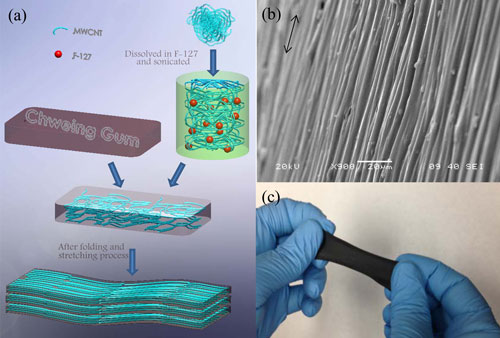| Posted: Dec 02, 2015 |
New stretchable, wearable carbon nanotube sensor made with chewing gum
(Nanowerk News) Body sensors, which were once restricted to doctors’ offices, have come a long way. They now allow any wearer to easily track heart rate, steps and sleep cycles around the clock. Soon, they could become even more versatile — with the help of chewing gum.
|
|
Scientists report in the journal ACS Applied Materials & Interfaces ("Gum Sensor: A Stretchable, Wearable, and Foldable Sensor Based on Carbon Nanotube/Chewing Gum Membrane") a unique sensing device made of gum and carbon nanotubes that can move with your most bendable parts and track your breathing.
|
 |
| (a) Schematic diagram of the preparation method for the MWCNT/gum membrane. (b) SEM image of the MWCNT/gum membrane cross-section (the arrow shows the stretch direction). (c) Optical image of the MWCNT/gum membrane (6 wt % MWCNT). (©ACS) (click on image to enlarge)
|
|
Most conventional sensors today are very sensitive and detect the slightest movement, but many are made out of metal. That means when they’re twisted or pulled too much, they stop working. But for sensors to monitor the full range of a body’s bending and stretching, they need a lot more give. To meet that need, some researchers have tried developing sensors using stretchy plastics and silicones. But what they gained in flexibility, they lost in sensitivity. Malcolm Xing and colleagues found a better solution right under their noses — and in their mouths.
|
|
To make their supple sensor, a team member chewed a typical piece of gum for 30 minutes, washed it with ethanol and let it sit overnight. The researchers then added a solution of carbon nanotubes, the sensing material. Simple pulling and folding coaxed the tubes to align properly. Human finger-bending and head-turning tests showed the material could keep working with high sensitivity even when strained 530 percent. The sensor also could detect humidity changes, a feature that could be used to track breathing, which releases water vapor with every exhale.
|

